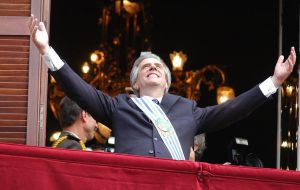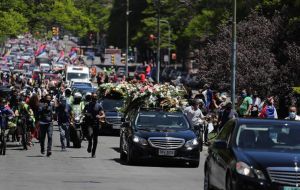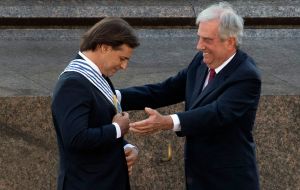MercoPress. South Atlantic News Agency
Uruguay's twice president Tabare Vazquez dies: kilometers of vehicles followed the funeral procession
 The funeral procession left on Sunday, 13:00 hours from Town Hall where Vazquez was first elected mayor
The funeral procession left on Sunday, 13:00 hours from Town Hall where Vazquez was first elected mayor  “Uruguayans, celebrate, Uruguayans, celebrate”, was his famous message to the crown on the night of victory, November 2004.
“Uruguayans, celebrate, Uruguayans, celebrate”, was his famous message to the crown on the night of victory, November 2004.  People were invited to follow the procession in their vehicles with Uruguayan and Broad Front flags
People were invited to follow the procession in their vehicles with Uruguayan and Broad Front flags  In March 2020, Vázquez hands the presidential sash and symbols to elected president Luis Lacalle Pou
In March 2020, Vázquez hands the presidential sash and symbols to elected president Luis Lacalle Pou Two times former Uruguayan President Tabaré Vázquez died early morning Sunday in Montevideo at the age of 80 after suffering from lung cancer and pancreatic metastasis. By early afternoon and following on the family's wishes Vazquez was buried in a private ceremony at the La Teja cemetery, the working neighborhood where he grew up.
The center-left politician and radiation oncologist was president of Uruguay in 2005-2010 and 2015-2020 and was diagnosed with cancer last year towards the end of his second term. The Broad Front party he belonged to ran the country of 3.4 million people for 15 years up until elections last year.
His son Alvaro Vazquez said he died at home, in the presence of family and friends. “On behalf of the family, we want to thank all Uruguayans for the love received by him over so many years,” he tweeted.
Vazquez, who interchanged terms with Jose Mujica since Uruguay’s constitution bans presidents from serving consecutive terms, presided over the legalization of the state-controlled production, distribution and sale of cannabis, and installed a national health scheme.
The son of a union leader who grew up in a working class district in the capital Montevideo, he was popular with Uruguayans for a mix of pro-business economic policies and strong welfare programs which helped kick-start a decade of robust growth based on the global commodities boom. Uruguay is an exporter of quality beef, dairy produce, bovine technology, wool and lately pulp and wood.
As is common in Uruguayan politics, Vazquez was linked to football and for several years was a member of the managing board of Progreso, from the Montevideo main soccer league. In 1989, he was elected mayor of Montevideo, and finally after two failed attempts he reached the Uruguayan presidency in 2005, cracking the monopoly of the two historic parties system (National and Colorado) which have ruled the country since independence in 1830.
“Uruguayans, celebrate, Uruguayans, celebrate”, was his famous message to the crown on the night of victory.
Vazquez became mayor and later president as the leader of the so called Broad Front, a successful catch-all coalition with an arch extending from the Christian Democrats to the Communist and former guerrilla movement. He helped turn Montevideo, where half of the Uruguayan people live, in a stronghold of the Broad Front, which ten years later helped him become president.
Although the official Broad Front biography of Vazquez ignores the eleven years of military dictatorship, the fact is he worked as an oncologist for the Police Hospital and was a consultant of the Military Hospital, plus having enjoyed overseas scholarships in France, Israel and Japan at a time when Uruguayans were categorized by the military regime A,B,C (reliable, doubtful and non reliable), meaning he was A. But as a good mason, when the return of democracy to Uruguay in 1984, Vazquez played by the rules, and helped to definitively integrate the Broad Front to the political system.
His first presidency, 2005/2010, on the rollercoaster of the commodities boom was a well managed period for public finances, and social reforms. Likewise in foreign policy there was a strong clash with the Kirchner presidencies in Argentina over the setting up of a Finnish pulp industry in Uruguay, which Argentina claimed it contaminated shared waters and was point blank against it. Vazquez was not intimidated and years later it was admitted that US president George Bush had promised help if Argentine threats turned into something more serious.
However Vazquez second presidency was not so fortunate. First it had to deal with the chaos left by his predecessor, president Jose Mujica, and his dream of failed oversized projects, plus inflating government payroll with 70,000 new employees, and publishing as “a great achievement” stats showing an increase in the number of pension holders, well aware the system was in the red. Vazquez handed the presidency to opposition leader Luis Lacalle Pou, having been diagnosed with lung cancer, and the country with almost 6% GDP deficit, record unemployment, and a stagnant economy, plus several serious alleged corruption investigations.
Nevertheless he remains a hero for his followers and supporters, and his family indicated that given the Covid 19 pandemic protocols there would be no official mourning, “limited to sons and grandchildren at a private intimate ceremony in his home and at La Teja cemetery” and called on mourners to respect the strict sanitary rules imposed by government.
The funeral procession left on Sunday, 13:00 hours from Town Hall where Vazquez was first elected mayor, and people were invited to follow in their vehicles with Uruguayan and Broad Front flags. Hundreds poured to the streets to applaud the last trip of Vazquez as he was driven to his final resting place. There were many tears but overall people showed up with face masks and trying to respect sanitary measures.
Vazquez completed all his education in government schools and became a doctor in 1969. His wife Maria Auxiliadora Delgado died in July 2019, and he is survived by four sons. Even as president he continued with some of his oncologic clinics, since “he did not want to lose contact with the people”.
Vazquez was also a pioneer in combating smoking and imposed the ban in Uruguay forcing the country, on demands from tobacco giants, to several international demands and court hearings which Uruguay finally won. Once when asked why he had chosen oncology to specialize, he revealed he had lost several family members to the disease.
Elected leaders and political adversaries sent their condolences. President Lacalle Pou said he was expressing the deep sorrow of the Uruguayan people on the death of a president.
“Lately I had the chance to speak with Vazquez, obviously about political issues, and more intimately about family, and in life it is good that political differences remain in the political sphere and don't trespass to personal matters. I will always be grateful for having known a man who always fought, a true fighter, and he fought to the end” He added this last battle “he faced it with great courage and serenity”. Finally “form indicates that the whole of Uruguay is in mourning and so we have decreed it. He served his country and based on effort he managed great achievements, RIP President Tabaré Vazquez”.
Two times former president Julio Maria Sanguinetti also expressed his condolences and remembered Vazquez as “a respectful adversary and a democratic ruler. He led the Broad Front to office, a historic milestone” and as to his second presidency, “I respect the decision of the people, and value what he was and did” The fact that Vazquez became president “blew away many phantoms, and I am convinced of this and I believe this is his great achievement and legacy. In effect he brought the Broad Front to accept liberal democracy, the rule of the law and market economy” Sanguinetti added “nowadays we connect zoom and can see how great is the legacy left by Dr. Vazquez”, with “whom I had an affectionate relation”
Sanguinetti's words, as the first democratic elected president of Uruguay following the military dictatorship, (1985/1990) refer to the fact that several groupings of the Broad Front, including the Tupamaro guerillas, back in 1973 openly supported the military coup, believing it would “liberate Uruguay from the dominating oligarchy and corrupt parties” History has proven the wishful thinking and how naive they were, because it took the Broad Front some 18 years to realize that through politics and free elections they could play a role in achieving their goals. Following the political amnesty of 1985, many feared that some Broad Front groups would return to violence as the instrument to reach power.
Former president (and guerrilla member) Jose Mujica recalled Tabare Vazquez as “ a companion, son of the working class and very much linked to the problems of the proletarian neighborhood as was La Teja”. “He has left us a challenge and a very important boost, he was convened to political representation by the strong social prestige he achieved in the football club Progreso and Arbolito, in Lafone square, with all its shortcomings”.
Mujica added the best way to remember him is to continue political militancy for a better country. “Tabare not only belongs to the Broad Front, he belongs to the Uruguayan people and to La Teja” “When I look back what was most poignant and I most remember was when the Plan Ceibal, which distributed a laptop to each school child in the country: he realized the digital world was here and it was the poor that would have the heaviest burden”. “Until forever Tabare and forever”.
Argentine president Alberto Fernandez recalled that “Tabare was that, a most respectful man, a very great man, a very important man for all of us”. It is an irony that “the dredged illness against which he always fought finally took him away from us” in reference to the lung and pancreatic cancer.
As to differences with Argentina, Fernandez who was also cabinet chief o Nestor and Cristina Kirchner, underlined that “with Tabare, besides our differences I always had an affectionate and respectful relation”




Top Comments
Disclaimer & comment rulesCommenting for this story is now closed.
If you have a Facebook account, become a fan and comment on our Facebook Page!